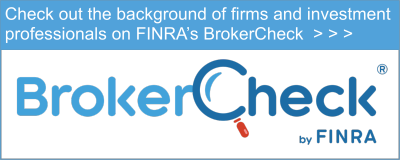November 2018 Newsletter
Be Proactive to Enjoy Real Peace of Mind This Holiday Season
Let’s say you’re about to take a long drive to visit an old friend, and you’re looking forward to it. You plan to take a scenic route, listen to music, and enjoy the trip as much as the visit. Now, let’s say that a couple days before you’re set to leave, your car starts making a funny noise. A day later, the noise stops. Now, you have a choice to make. Do you take the car into the shop and get it looked at, possibly delaying the trip you were looking forward to? Or do you risk it: take the trip and simply hope the noise doesn’t come back or lead to a possible breakdown?
That analogy reflects a dilemma many people have with their finances at this time of year—especially this year, considering the dramatic turn the financial markets took in October. Most of us look forward to the holiday season, and we want to enjoy the coming weeks of parties, celebrations, and time with family and friends as much as possible. We don’t want our holiday season marred by distractions or worries of any kind, especially financial worries. But sometimes the ability to achieve your financial goals comes down to a choice.
We can just assume everything in our retirement plan and portfolio is still in good working order, and hope that assumption alone will be enough to keep all your worries at bay in the coming weeks. Or, we can play it safe and take the car into the shop (metaphorically speaking) so we know we’ll be able to fully focus on what’s important during the holidays, completely free from nagging concerns like: “Is my financial plan still sound?” or “Is my money really safe?”
Be Sure, Not Hopeful
This is exactly why my office makes a point every November and December of increasing our schedule of client reviews, and of reaching out to clients to encourage them to get on that schedule. I consider it a great holiday gift we’re able to offer every year: the gift of peace of mind. Yes, it takes more effort on your part to attend the meeting and have the review than it does to simply assume all is well and hope for the best. But, as I’m sure you’ll agree, hope and certainty are not the same things. The latter is always much better than the former, especially where your money is concerned.
This isn’t to say, of course, that any financial strategy is 100% certain, any more than a car is completely immune from mechanical defects. But you can increase your odds of safety and reduce your financial risk by making periodic adjustments to your portfolio when needed—just as you can reduce your odds of car trouble with professional maintenance.
That’s because circumstances and situations in your own life and in the financial markets are constantly changing, and those changes can sometimes mean that a strategy or allocation that was best suited to your goals a year ago may no longer be best. Those changes could mean that new opportunities to maximize your retirement income may have emerged, or that certain assets may no longer be as well-insulated against market volatility as they once were.
Getting back to the analogy, you might think of all the volatility the market experienced in October as the “funny noise” your car was making. After trending mostly upward all summer, the stock market took a major turn last month. In the last full week of October, the Dow Jones Industrial Average sank by 9% from its high for the year, while the Nasdaq and S&P 500 both fell by more than 10% and officially entered correction territory before partially rebounding.*
Disconnect Continues
These slides occurred amid strong third-quarter earnings reports and an estimated GDP growth rate of 3.5% for the quarter. That’s down from 4.2% in the second quarter, but still indicates a healthy, growing economy fueled by the Trump Administration’s tax cuts. If Wall Street’s failure to celebrate all the positive recent data seems odd, keep in mind that for years I’ve been explaining how the reckless overuse of quantitative easing by the Federal Reserve has created a disconnect between market performance and economic fundamentals. So just as the stock market soared for all those years (thanks to artificial stimuli) while the economy was slow and sluggish, it should come as no surprise to see the market struggling while the economy is—by many indicators—actually booming.
The underlying reality is that Big Investors know the current boom could, as many analysts believe, be a temporary “sugar high” from the Trump tax cuts and that growth could be further undermined by the intensifying trade dispute with China, fears over inflation and interest rates, the skyrocketing federal deficit, and a host of other factors.
So even though the markets got back on track recently, meaning that the troubling “funny noise” your car was making suddenly went away, ask yourself this: wouldn’t you still take it in for a checkup before a long trip anyway, just to be safe?
In my experience, I know the answer to that question for most people is “yes.” In fact, most people would get their car checked out before a long trip, noise or no noise because they know the potential downside of not taking that precaution outweighs the upside. Think about it: the upside is a successful trip, but one marred by worry. The downside is that your car dies on the road and you end up with a towing bill, plus a much bigger repair bill than if you had caught and fixed the problem when it was still minor. You might not even make it to see your friend.
Now, think about that in terms of your portfolio as we head into the holidays. You only get one chance to get your retirement right. Make the right decision!
*“Another Wild Selloff; Dow Sinks 546 Points,” CNN Business, Oct. 11, 2018
**bea.gov, Oct. 26, 2018
Copyright © 2018. All Rights Reserved, Pacific Financial Planners, LLC.
Pacific Financial Planners, LLC is an Independent Registered Investment Advisor. Securities offered through Western International Securities, Inc., headquartered in Pasadena CA. Pacific Financial Planners, LLC and Western International Securities, Inc. are separate and unaffiliated. The material contained within are the opinions of Jerry Slusiewicz only and are neither an offer or recommendation to buy or sell any securities or strategies mentioned. You should always check with your professional financial advisor and/or tax advisor before taking any action on any of the securities or strategies contained on this site.
 Pacific Financial Planners, LLC.
Pacific Financial Planners, LLC. Pacific Financial Planners, LLC.
Pacific Financial Planners, LLC.